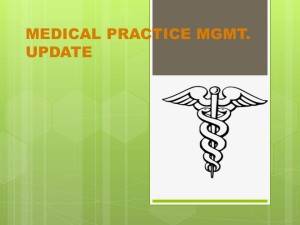 The business side of medical practice is more demanding than ever before, in fact it practically takes an expert MBA to keep up with many of the issues as they rapidly change and evolve. We found one, Chris Amato , CEO of Triton Practice Solutions shares some of his insights an outside expert brought in to “audit” top medical practices below. As always, the best medicine is preventative – Ike Devji
The business side of medical practice is more demanding than ever before, in fact it practically takes an expert MBA to keep up with many of the issues as they rapidly change and evolve. We found one, Chris Amato , CEO of Triton Practice Solutions shares some of his insights an outside expert brought in to “audit” top medical practices below. As always, the best medicine is preventative – Ike Devji
There are many additional challenges that the Medical and Dental communities are facing in today’s world that have increased significantly with the downturn in our economy compounded by the health care reform that our government is actively perusing. This leads to ask the one fundamental question to every Doctor in practice today … “Have you developed the ‘business’ side of your practice to match the level of the ‘clinical’ side of your practice?” This perspective is very foreign to many Doctors as they did not necessarily set out to be an entrepreneur or go to school to be a business owner. Yet as all Doctors experience after going into practice for themselves, owning a practice entails much more than being highly qualified clinicians.
The Doctors that I tend to work with are the savvy professionals that not only acknowledge this fact but have a desire to see their practice to be amongst an elite group, in that their “business side” equally matches the “clinical side” of their practice. These Doctors recognize that making money and keeping it are VERY different challenges that can and will be addressed in their practice. As a result of asking this not so exciting question, there are some very common problems that I find in the diagnostic process of evaluating the “business side” of their practice.
9 out of 10 practices will have some if not all of these areas as issues that need to be addressed (or in many cases readdressed). Here are the 5 most common areas:
1) Financial Systems – How is your money tracked and controlled?
Their needs to be the most complete, comprehensive and accurate billing systems in place. The revenue cycle management for billing however is only one aspect of the financial systems that need to be addressed. Unfortunately 3 out of every 4 practices will have some kind of financial impropriety/ embezzlement situation at some point in time within the life of the practice. How much money is the practice really making? How is the cash-flow being tracked? Is there any kind of practice budget, standards or variance reporting to identify any honest (or not so honest) errors in accounting? Going back to the fundamental principal… If you can not measure it, you can not manage it. Doctors do this well on the clinical side of the practice for patients. They would never prescribe a treatment plan until the information was gathered from the test run to begin to identify what the problem really is and how its impacting the patient. Yet from a financial perspective, if the financial systems have not been set up properly for managerial accounting. The tests cannot be run and the information is then not available to even identify that there is a problem. The notion of running a business based on the balance of the checking account will potentially leave much earned profit on the table and open the door for financial impropriety.
2) Corporate Formalities- Is your corporate veil intact?
A primary reason for setting up some form of corporation or legal entity is to separate the Doctor’s personal liability away from that of the practice itself. Regardless of the type of entity that was chosen and established (i.e. PC, PLLC, S. Corp. Etc) there are formalities that need to be followed and proven if challenged, to keep the asset protection in place. By not following the formalities, it could be said that the doctor has established the precedence that they are running the practice as a sole proprietor. Even though an entity like a corporation was set up and files taxes, they could be treated like a sole proprietor in the event of a lawsuit as a result of. This could force the liquidation of the doctors personal assets to satisfy a courts judgment.
3) Legal Documents – Are the “I’s” dotted and “T’s” crossed?
Documentation, documentation, documentation… There is a pretty good understanding in most practices of the necessity for documentation in such areas as HIPPA or OSHA compliance and patient records but there are other legal documents that are many times overlooked or not established in a correct or complete manor. Things like formal loan documents to and from shareholders, rental agreements, Shareholder Operating and Buy/Sell agreements, to name just a few, are monumentally important. These legal documents are not the day to day squeaky wheel if you will, but they can go from not being the squeaky wheal to the blaring siren once a negative event calls for their presence and they are incomplete or nonexistent. By making sure you dot the “I’s and cross the “T’s” in these and other fundamental documents can be the very thing that stops a financial catastrophe in its tracks. Having these documents reviewed by a third party who can help identify areas of exposure or weakness is usually a good safeguard.
4) Tax Returns – Are they accurate? Are there “Red Flags”?
One of the biggest misconceptions pertaining to the taxation of a practice and its doctors is that the accuracy and liability of the tax returns falls on their accountant or CPA. Any of the accounting firms and CPA ‘s I have ever worked with (and that is literally hundreds around the country) issue some formal statement indicating something along the lines of… “We have NOT audited the accompanying financial statements and accordingly do not express any opinion or any other form of assurance on them. Likewise, the tax return itself in the box where the individual or shareholder signs the return states… “Under penalties of perjury, I declare that I have examined this return… and to the best of MY knowledge and belief, it is true, accurate and complete.” This then places the liability for accuracy back on to the individual or entity filing the return. With the IRS making it well known that they have more than tripled their audit loads and that they are really scrutinizing higher income, service oriented businesses, this is a “business side” of the practice issue that needs to be addressed. In defense of most accountants and CPA’s, the majority of the issues I flag here are NOT a result of an incompetent CPA but rather the result of things like… lack of information, lack of communication and the doctors not knowing the questions to ask.
5) Asset protection & Estate Planning – Are you and your family protected?
As I mentioned earlier, it is one thing to make money, it is another thing to keep it. The more money that a doctor makes, the more assets they accumulate, the more successful a practice is, the bigger target they become. Protecting your life’s work in the event of a lawsuit as well as ensuring that your wishes and assets make their way to your designated heirs can only be accomplished through proper planning. I recently had a conversation with a Doctor regarding this area and his first response was very negative towards the cost of doing this planning in a complete and comprehensive manor. This is probably the most common response and objection to this issue that I encounter. After doing a simple review of his financial statements, the cost to do comprehensive planning was significantly less than what he had spent that year in advertising. He was willing to spend double, almost triple the planning cost to make more money through his advertising efforts but not willing to spend a fraction of the amount to protect his life’s accomplishments (not to mention his family). This was a very sobering reality check for that doctor putting things in a very different perspective.
As I mentioned before, with 9 out of 10 practices having one or more of these areas that need to be addressed the question is not… “should I have these areas reviewed by a third party?” but rather “when do we get started”.
For more information on how an audit can help your practice contcat Chris Amato, MBA CEO/ Senior Advisor at Triton Practice Solutions chris@tritonba.com 480-477-5775 . Prior to founding Triton, Chris traveled across the country analyzing businesses in a vast array of industries. All in all he has seen more than 600 companies literally from coast to coast. He was ranked in the top 5% of over 250 Business Analysts with a large national consulting firm. Chris also earned a number of various awards for his work including the coveted “Directors Circle Award “ for his exemplary business diagnostic skills as well as being nominated by the firm’s senior executives to “Presidents Cabinet” (An advisory counsel). With over 15 years of entrepreneurial experience and his business model to “Empower Your Business”, he is committed to helping business owners succeed.


